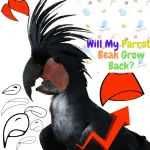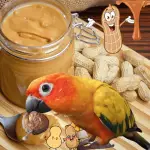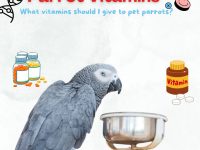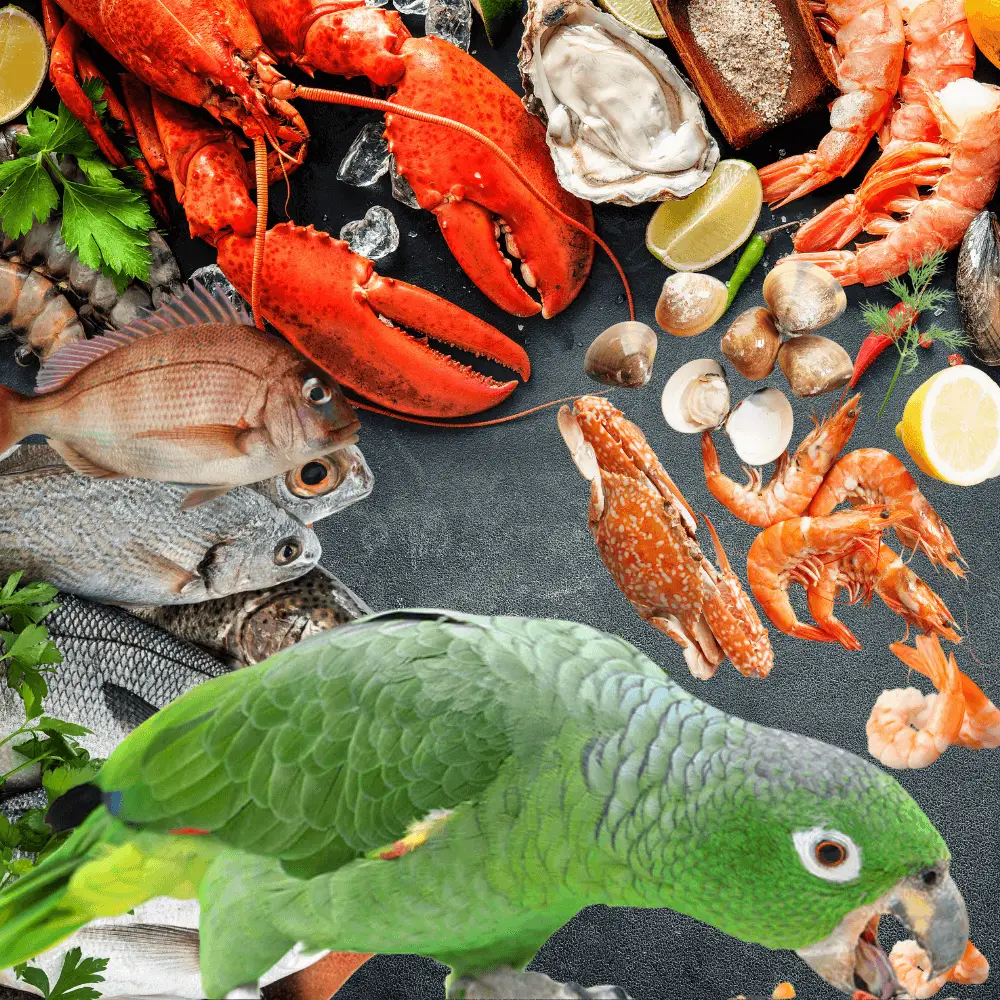
Do parrots eat fish and seafood: fish and seafood are good sources of animal protein. They are also rich in omega-3 fatty acids, calcium, vitamin D, and phosphorus. They can improve a parrot’s immune system, brain function, bones, feather quality, beak, and energy levels. However, consider the less obvious pitfalls before feeding a parrot fish and seafood.
Parrots can eat fish and seafood. However, exposure to pollutants, toxins, and heavy metals (mercury) can make crabs, shrimp, and crustaceans less healthy. This also applies to fish, especially tuna, which has a high mercury content. Salmon, cod, and catfish contain lesser amounts of these harmful substances.
Farmed fish is the safest option. If you feed your parrot canned fish, make sure it is a fish packaged in water, with no added salt or oil. Fish and seafood can be safely given to your parrot, in small quantities, as a treat. However, too much can throw your parrot’s diet off balance and lead to digestive problems.
Are parrots allowed to eat fish?
Fish is a healthy food because it contains vitamins, minerals, and nutrients that are not found in other varieties of foods.
That said, parrots should only be fed fish 1-2 times a week (and only some healthier varieties). Fish and seafood do not replace other staple foods, such as pellets, fruits, and vegetables.
High-quality animal protein
Along with the chicken, fish is considered one of the best sources of animal protein. This is because it is lower in saturated fat and calories. Parrots need large amounts of protein in their diet to:
- Muscle growth
- Tissue repair
- Grow strong feathers
- pH and fluid balance
The best source of protein comes from animals. Vegetarian diets contain certain amino acids but lack several essential amino acids, such as lysine and methionine.
Eating the recommended amount of fish per week can increase a parrot’s lifespan. It’s better than red meats, many of which are linked to certain diseases.
Omega 3 fatty acids
Fish rich in omega-3 fatty acids are salmon, sardines, herring, lake trout, and light tuna. The two types of omega-3 fatty acids found in fish are eicosapentaenoic acid (EPA) and docosahexaenoic acid (DHA).
Omega-3 fatty acids are beneficial in the following ways:
- Prevention of cardiovascular disease
- Decreased risk of atherosclerosis (hardening of the arteries)
- Increased levels of high-density lipoprotein (HDL)
Salmon and sardines are often used to extract omega-3s for use in vitamin capsules.
Calcium
Seeds, leafy greens, and fruits are not a rich sources of calcium. Parrots may therefore be deficient in calcium.
Some types of fish meat are a good source of calcium. Calcium is essential for maintaining healthy joints and strong bones. This is crucial for parrots, which rely heavily on their bones:
These parts of the body are all made up of bones. If your parrot is deficient in calcium, it may be:
- Brittle feathers
- Beak chips
- Heels crack or develop cracks
- Compromised eggshell production
- Desertion of egg-laying (the young do not hatch)
Calcium-rich fish include sardines, salmon, anchovies, and shrimp.
Phosphorus
Phosphorus plays a vital role in bone formation, so it’s an essential mineral for your parrot’s body. Fish contain phosphorus in abundance, which contributes to:
- Use proteins for the growth, maintenance, and repair of cells and tissues.
- Making ATP, a molecule used in the body to store energy.
- Improve kidney function
- Regulate muscle contractions
- Maintain regular heart rate
- Maintain the strength of nerve signals
Fish with high phosphorus content are carp, sardines, clams, and hake.
Vitamin d
Parrots do not do well in dark and secluded environments. This is partly because it limits the amount of vitamin D they absorb from the sun.
However, if your parrot needs an extra boost during the dark winter months, give him fish. Experts agree that fish and fish products are among the best sources of vitamin D.
The main role of vitamin D is to keep bones healthy, which it accomplishes by promoting calcium absorption. Even if your parrot ingests calcium and phosphorus, a lack of vitamin D will still lead to brittle and weak bones.
Vitamin D strengthens your parrot’s beak, talons, and feathers:
- Reduce inflammation
- Promote cell growth
- Strengthen the immune system
The best sources of vitamin D in fish are fatty fish, such as mackerel, herring, tuna, and salmon.
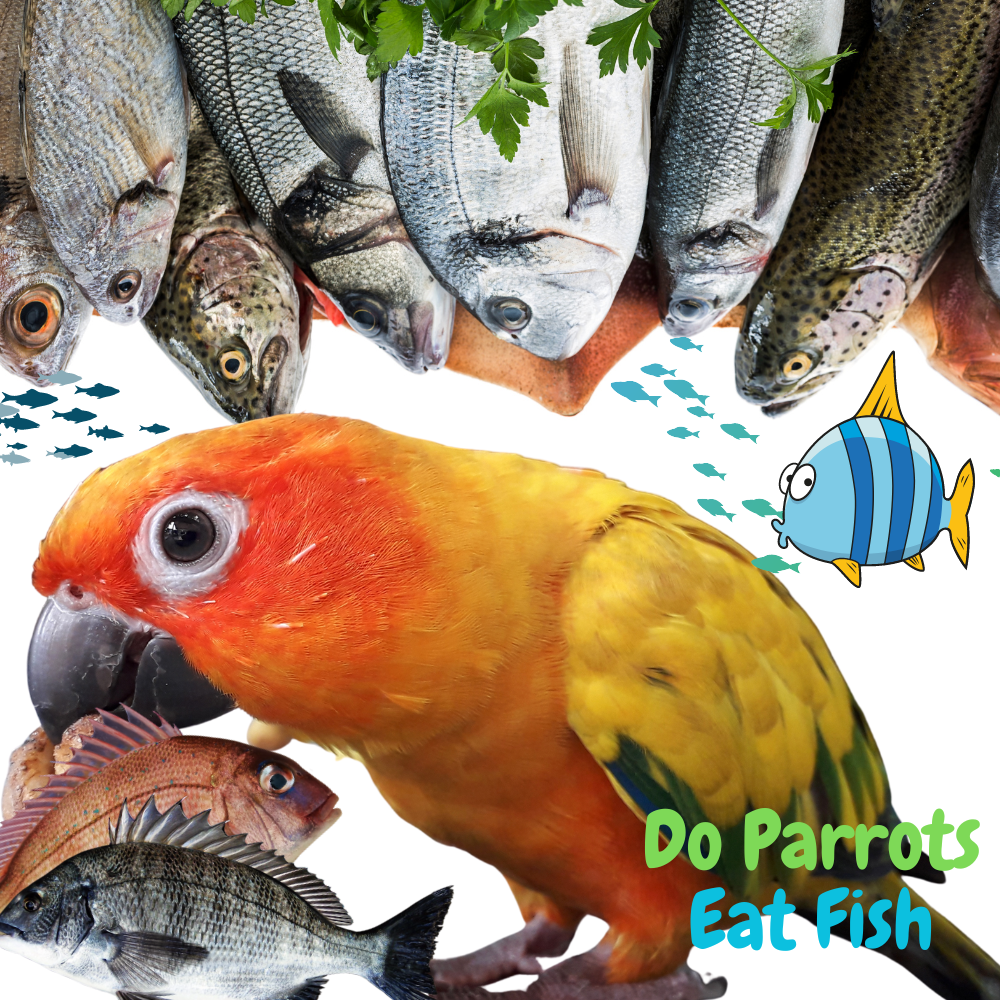
Do parrots like fish?
Parrots love the taste of fish. This type of meat is lean, tasty, and easy to tear. However, your parrot may be reluctant to try new foods. If so, you can do the following:
- Offer fresh fish. Your parrot might not appreciate the packaged flavor.
- Avoid using seasonings or oil. The more food is natural, the healthier it is.
- Eat fish with your parrot. He may enjoy sharing a meal with you and trust the meal once he sees you eat it.
- Offer it by hand. He may be reluctant to taste new foods in his bowl, but he accepts the food you give him in his hand.
- Let him study. Put the fish on the table and let your parrot grope it, smell it and lick it.
Do parrots eat fish in the wild?
In the wild, parrots rarely eat fish because they have trouble hunting it.
Piscivorous birds have long, pointed beaks for stabbing fish in water. The pelican is an exception, but this bird has a pouch that allows it to collect fish. Since parrots have hooked beaks, it is difficult for them to retrieve fish from the water.
Can parrots eat seafood?
Parrots can eat seafood, such as:
- Lobsters
- Shrimp
- Clams
- Oysters
- Squid
- Octopus
These types of meat have the same health benefits as fish. rich in vitamins, minerals, and other essential nutrients. However, they also contain compounds that can make them harmful to parrots, including:
Pollutants
Shellfish are more likely to retain pollutants from the oceans. This is especially true for mollusks and crustaceans, which feed on decomposition or waste found in the seabed.
While many types of seafood are raised on farms that limit contamination, this is not always the case. Wild-caught seafood is often considered fresher and tastier.
While you may appreciate this feature, your parrot’s body may not cope with it as well. Parrots are more susceptible to bacteria and toxins than the average man.
Shellfish toxins
In addition to chemicals or man-made waste, shellfish can be exposed to natural hazards. These include different forms of bacteria, parasites, and toxins.
Crabs and shrimp depend on algae as one of their main food sources. Some types of algae are toxic and remain in the flesh of the crustacean.
Of course, strict safety standards are in place to prevent a toxic crustacean from reaching your plate. However, the risk is always higher than with fish.
Mercury
Heavy metals, such as mercury, can accumulate inside fish and other marine animals, making them more toxic to eat. Shellfish are more likely to retain these toxins after being cooked.
Small fish have higher levels of mercury, and larger fish contain less. Seafood preparation affects the amount of mercury present.
The types of fish or seafood that contain less mercury are:
- Salmon
- Cod
- Catfish
- Pollock
- Oysters
- Clams
- Sardines
Can parrots eat shellfish?
Shellfish contain more toxins than other fish. However, you can give shells to a parrot if you.. :
- You have verified the origin of the shells
- Cook the shellfish carefully
- Do not give shells to young, old or sick parrots.
Can parrots eat tuna?
Tuna contains protein, omega-3 fatty acids and B vitamins, which are good for the health of parrots. Unfortunately, tuna also contains high amounts of salt and mercury. Tuna contains more mercury than any other seafood.
Light tuna and skipjack have the lowest concentration of mercury, while bigeye and albacore tuna have the highest concentration. As in humans, mercury can accumulate in parrots’ body tissues over time.
Tuna also contains sodium (salt), so parrots should be given in moderation. Opt for tuna packaged in water, as tuna packaged in oil will be too fatty for your parrot, leading to weight gain, digestive problems, and lethargy.
Can parrots eat salmon?
Salmon is one of the best fish to feed parrots.
It is rich in vitamins and minerals, easy to find, and less likely to contain mercury. Baked salmon and smoked salmon are both good choices. Avoid adding salt or seasonings.
Can parrots eat cod?
Cod is less likely to contain mercury.
You can grill, smoke, cook or sear the cod in a frying pan. Be careful not to add oil or flavorings. While it may taste bland to you, plain cod is delectable to parrots.
Can parrots eat crab legs?
Parrots can eat crab legs, but they are crustaceans, which carries additional risks of contamination. If you have crab legs from good provenance, they can be a healthy treat.
Crab legs have soft and juicy flesh, rich in omega-3 fatty acids, proteins, and vitamins. Your parrot may even enjoy tearing off the hard outer shell.
Can parrots eat shrimp?
The consumption of shrimp carries dangers due to pollutants.
Parrots will benefit from antioxidants and fatty acids. They can remove the shell and gnaw the meat underneath, making it a fun and rewarding experience for them.
Can parrots eat fish sticks?
Parrots should not be fed fish sticks. Although the meat at the base is healthy, fish sticks are usually breaded and fried. They have a high content of fats, starch, and added salts.
Can parrots eat sardines?
Sardines can be safely given to your parrot. However, they should only be offered in small quantities because sardines are fatty fish rich in calories.
How to prepare seafood for your parrot?
Thoroughly cooking seafood reduces the number of toxins present.
The best ways to prepare seafood for parrots are:
- Baking
- Baking
- Grill
- Boil
Do not add oil, seasoning or salt during the process of cooking or preparing fish. Thus, avoid breading or frying fish. Fish is high in sodium, so it is not recommended to add additional unhealthy ingredients.
Share this article with your parrot friends on social networks!

